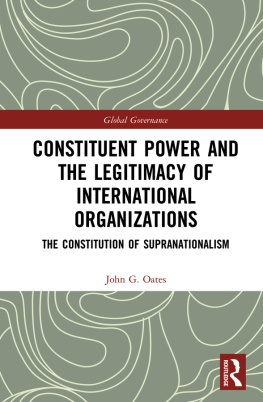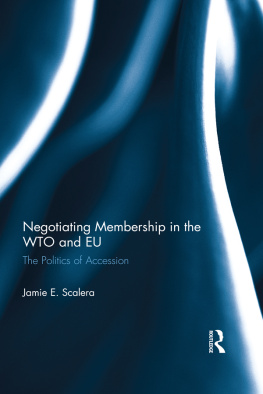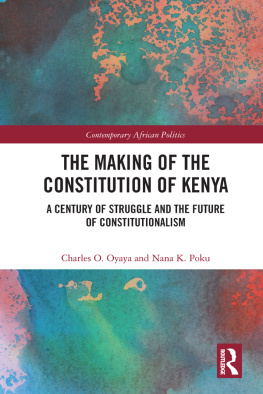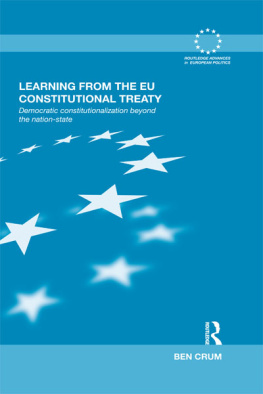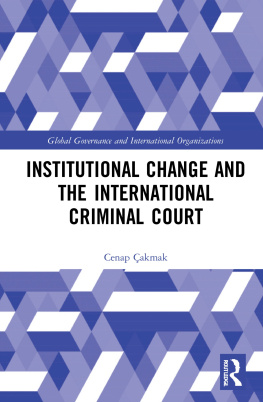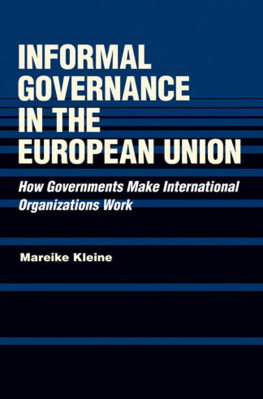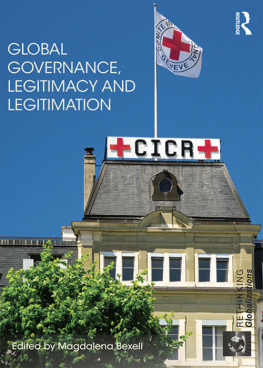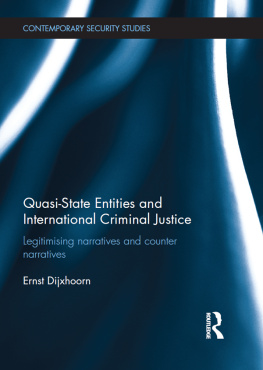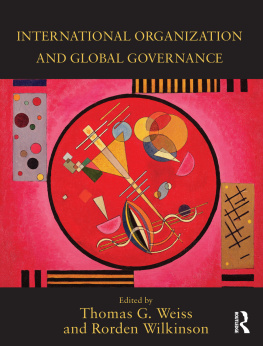Contents
This book has its origins in the dissertation I wrote at The Ohio State University, and though the book has evolved significantly beyond the arguments of the dissertation, I nevertheless owe a debt to those who helped me first develop some of the core commitments and intuitions that continue to shape my scholarship. Particular thanks are owed to my dissertation committee members, Alex Wendt, Jennifer Mitzen, and Alex Thompson, who encouraged me to think creatively about international organizations and supported the project in its early stages. I also benefited from the support of my fellow graduate students at OSU, especially Eric Grynaviski, Tim Luecke, Scott Powell, and Clement Wyplosz.
Most of the work on this book occurred while I was an assistant professor at Florida International University, and I am thankful for the stimulating and pluralistic intellectual environment of the Department of Politics and International Relations and the support and friendship of my departmental colleagues, especially Alex Barder, John Clark, Erin Damman, Kevin Evans, Harry Gould, Markus Thiel, and Susanne Zwingel. Thanks also to Christine Bianco, who provided excellent research assistance over the course of a year. The Morris and Anita Broad Research Fellowship Award also generously provided financial support for part of the research conducted for this book.
The manuscript benefitted from the assistance of a number of people who read and provided comments on various parts of the manuscript at different stages of its development, including Patrick T. Jackson, Mark Raymond, Lora Viola, and the anonymous reviewers at Routledge. Thanks are also due to the editors at Routledge, John Kirton and Robert Sorsby, who have been patient with and supportive of the project. Parts of Chapters 2 and 5 previously appeared in my article The Fourth Face of Legitimacy: Constituent Power and the Constitutional Legitimacy of International Institutions, published in Review of International Studies, Volume 43, Number 3. Parts of Chapter 2 previously appeared in my article When Delegation Fails: The Politics of Indivisible Sovereignty published in the Journal of International Relations and Development, Volume 22, Number 3. I thank the publishers for the permission to use this material here.
An immeasurable debt is owed to my wife, Diane, my daughter, Evelyn, and my son, Aiden, who have been a constant source of love, support, and needed distractions throughout the writing of this book. Much more than this book would not have been possible without their love and support. This book is dedicated to the memory of my father, Thomas R. Oates, whose curiosity about the world and his passion to explore it have shaped my own interest in world affairs in ways I am still discovering.
Aaronson, Susan. 1996. Trade and the American Dream: A Social History of Postwar Trade Policy. Lexington, KY: University Press of Kentucky.
Aaronson, Susan. 2002. Taking Trade to the Streets: The Lost History of Public Efforts to Shape Globalization. Ann Arbor, MI: University of Michigan Press.
Abbott, Andrew. 1995. Things of Boundaries. Social Research 62 (4): 85782.
Abbott, Kenneth. 1999. International Relations Theory, International Law, and the Regime Governing Atrocities in Internal Conflicts. The American Journal of International Law 93 (2): 36179.
Abbott, Kenneth, and Duncan Snidal. 1998. Why States Act Through Formal International Organizations. Journal of Conflict Resolution 42 (1): 332.
Abbott, Kenneth, and Duncan Snidal. 2000. Hard and Soft Law in International Governance. International Organization 54 (03): 42156.
Abbott, Kenneth, and Duncan Snidal. 2009. The Governance Triangle: Regulatory Standards, Institutions and the Shadow of the State. In The Politics of Global Regulation, edited by Walter Mattli, and Ngaire Woods. Princeton, NJ: Princeton University Press.
Abbott, Kenneth, Robert Keohane, Andrew Moravcsik, Anne-Marie Slaughter, and Duncan Snidal. 2000. The Concept of Legalization. International Organization 54 (03): 40119.
Ackerman, Bruce A. 1991. We the People: Foundations. Cambridge, MA: Harvard University Press.
Ackerman, Bruce A. 2000. We the People: Transformations. Cambridge, MA: Harvard University Press.
Ackermann, Alice. 1994. Reconciliation as a Peace-Building Process in Postwar Europe. Peace & Change 19 (3): 22950.
Allan, Bentley B. 2018. From Subjects to Objects: Knowledge in International Relations Theory. European Journal of International Relations 24 (4): 84164.
Alter, Karen J. 1998. Who Are the Masters of the Treaty?: European Governments and the European Court of Justice. International Organization 52 (01): 12147.
Alter, Karen J. 2008. Agents or Trustees? International Courts in Their Political Context. European Journal of International Relations 14 (1): 3363.
Alter, Karen J. 2014. The New Terrain of International Law: Courts, Politics, Rights. Princeton, NJ: Princeton University Press.
Anderson, Carol. 2003. Eyes off the Prize: The United Nations and the African American Struggle for Human Rights, 19441955. New York, NY: Cambridge University Press.
Aron, Raymond. 1957. Historical Sketch of the Great Debate. In France Defeats EDC, edited by Raymond Aron, and Daniel Lerner. Cambridge, MA: MIT Press.
Avant, Deborah, Martha Finnemore, and Susan K. Sell, eds. 2010. Who Governs the Globe? New York, NY: Cambridge University Press.
Ba, Oumar. 2017. International Justice and the Postcolonial Condition. Africa Today 63 (4): 4462.
Baldwin, Robert E. 1984. The Changing Nature of U.S. Trade Policy since World War II. In The Structure and Evolution of Recent U.S. Trade Policy, edited by Robert E. Baldwin, and Anne O. Kreuger, 525. Chicago, IL: University of Chicago Press.
Balzacq, Thierry. 2005. The Three Faces of Securitization: Political Agency, Audience and Context. European Journal of International Relations 11 (2): 171201.
Barder, Alexander. 2015. Empire Within: International Hierarchy and Its Imperial Laboratories of Governance. New York, NY: Routledge.
Barkin, J. Samuel, and Bruce Cronin. 1994. The State and the Nation: Changing Norms and the Rules of Sovereignty in International Relations. International Organization 48 (01): 10730.
Barnett, Michael and Martha Finnemore. 2004. Rules for the World: International Organizations in Global Politics. Ithaca, NY: Cornell University Press.
Barshack, Lior. 2006. Constituent Power as Body: Outline of a Constitutional Theology. University of Toronto Law Journal 56 (3): 185222.
Bartelson, Jens. 1995. A Genealogy of Sovereignty. Cambridge: Cambridge University Press.
Bassiouni, M. Cherif. 1993. The History of the Draft Code of Crimes Against the Peace and Security of Mankind. Israel Law Review 27: 247.
Bassiouni, M. Cherif. 1997. From Versailles to Rwanda in Seventy-Five Years: The Need to Establish a Permanent International Criminal Court. Harvard Human Rights Journal 10: 11.
Bassiouni, M. Cherif. 2005. The Legislative History of the International Criminal Court. 3 vols. Ardsley, NY: Transnational Publishers.
Becker, Josef, and Franz Knipping. 1986. Power in Europe?: Great Britain, France, Italy, and Germany in a Postwar World, 19451950. Berlin; New York, NY: Walter de Gruyter.
Bello, Judith, and Alan Holmer. 1989. Special 301: Its Requirements, Implementation, and Significance. Fordham International Law Journal 13 (3): 25975.
Benedetti, Fanny, and John Washburn. 1999. Drafting the International Criminal Court Treaty: Two Years to Rome and an Afterword on the Rome Diplomatic Conference.

